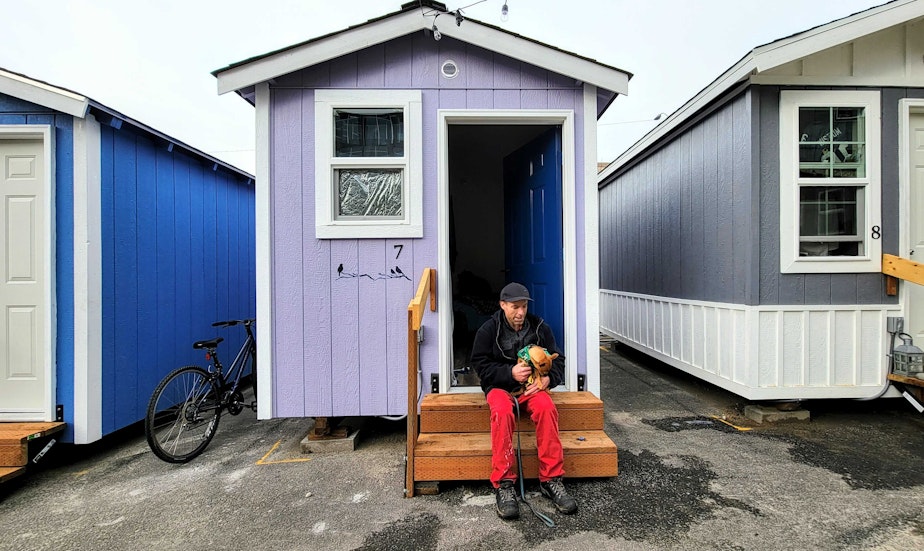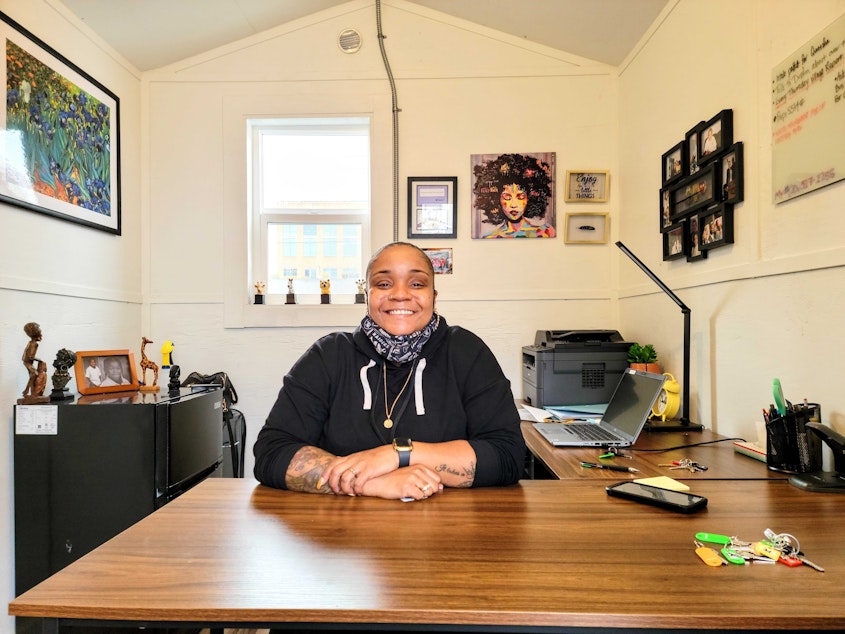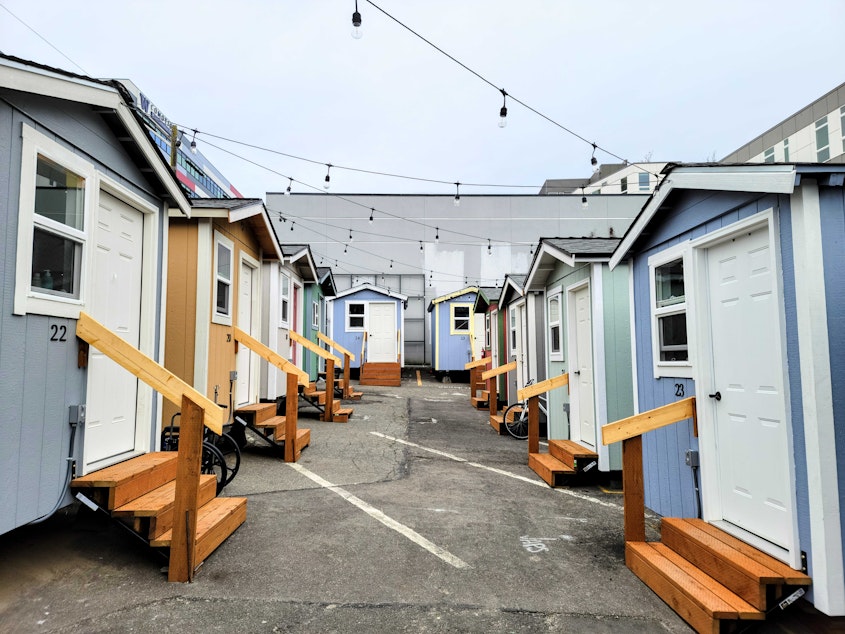The sidewalks are tidy outside this tiny house village in Seattle, because the residents keep it so

To help keep up with the housing crisis in Seattle, tiny house villages are expanding for people experiencing homelessness. This fall one village added more tiny houses, and two more opened up to people seeking temporary housing.
On Northeast 45th Street in the University District, just around the corner from the new light rail station, one full block of sidewalks is clear of cigarette butts and litter. That's because Austin Rusnak has been out here all morning with a push broom and a dustpan.
"I’m doing the back side today, I'll do this other side later on today,” Rusnak says, “just pick up all the garbage, syringes, ripped papers, whatever is out there. Just get it off the sidewalk. Just show community a little respect and common courtesy."
Rusnak wants to make a good impression on his new neighbors. He moved here in October, into the city’s latest tiny house village, on Roosevelt Avenue. The village, named Rosie's Place, is made up of rows of small, one-room homes that sit on a paved lot. Twenty-seven people live here now, but eventually there will be room for 70.
"It’s a nice community out here,” Rusnak says, holding his pet Chihuahua. “Everybody gets along together, everybody pitches in and helps and stuff. It's a good thing"
Rosie's Place is one of a dozen or so villages around the city. Tiny houses work as transitional housing for people like Austin, who are moving out of a tent, and hopefully someday into an apartment.
Sponsored
This village has case managers onsite and a code of conduct residents must follow. Like, you can get kicked out for stealing or bringing a weapon to the site. The person who enforces that code of conduct is operations manager Ejay Henry. Her office is at the front of the village and filled with art and decorations.
"Here, we're a family,” Henry says at her desk, “I have my office looking like this for a reason, because I want them to feel like, ‘Homie, come in here; we're a family, we take care of each other, you have security, you're safe here.’ That's how my village is run.”
Henry is proud of the services at Rosie’s. She shows off the laundry room and communal kitchen. Each tiny house is painted a different color and has a little covered stoop. Before this job Henry used to be homeless, too, while raising her son.

"I know when I was homeless in 2014, if they had something like this for me and my son, that would have helped me and my kid a lot. A whole lot,” says Henry.
Sponsored
These villages have changed quite a bit since they first started opening in 2018. Many of the houses were identical and the villages felt a bit industrial.
Sharon Lee runs the Low Income Housing Institute, which operates Rosie's Place and other shelters.
"In the beginning, people were very fearful of villages,” Lee says, “they said, ‘Oh, we should just have them in industrial areas.’ But we're not housing widgets, we're housing people, right? So people belong in neighborhoods. This is a great neighborhood.”
Rosie's is right in the heart of U-District, by the University of Washington, right on the bus line and across the street from a row of stores. One of those stores is a doughnut shop where Kenny Morris is the manager.
"So far so good,” Morris says, “it's been good just because we haven't heard anything."
Sponsored
Morris and the other businesses say they have had some issues before with people living outside, including a few fires in the alley next to the building. This year they all pitched in for a security guard.
Morris says he's concerned about the tent encampment next to I-5, just down the street from the village.
"I'm hopeful that this place is gonna do some good,” he says from behind the doughnut case, “but, I mean, Seattle's tried to conquer this problem how many times? Hopefully they have a plan and hopefully they can share it and hopefully it works out."
Overlooking Rosie’s is a modern apartment complex that was just built next door. And that's what Seattle needs a lot more of, Lee says, housing.
"In Seattle, we need thousands of more units of extremely affordable housing,” she says, “not everybody needs a whole lot of services. Of course we have people who do need some services, but we need the rents to be so affordable. Otherwise, we're going to just continue to see this rate of homelessness.”
Sponsored

Lee and the King County Regional Homelessness Authority agree that these villages, although a good transition off the street, are not long-term housing.
The goal is that people here stay six months before finding a permanent home. But some have stayed up to a year at a tiny house village — even two.
Marc Dones, CEO of the King County Regional Homelessness Authority, says they have no plans to sunset the current stock of tiny houses, but they don't plan on expanding the system either.
"Is this too much of one thing? And is it not allowing us to expand other things that other people right have requested?" Dones said. They say they see tiny house villages as one component on a menu of housing options.
Sponsored
Until he can get matched with a new place, Austin Rusnak says he'll keep his current home clean. "I get better sleep, and I'm more secure,” Rusnak says, “having your own key makes you feel, like, a little more human."
This fall when Rosie's Place opened the city of Seattle also increased the number of houses at the village in Interbay. Just this week a new village in Bitterlake called Friendship Heights opened. Together these three expansions can serve about 165 people in need of a tiny, temporary home.


